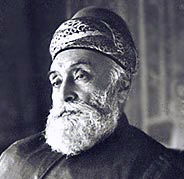Jamsetji Tata
Jamshetji | |
|---|---|
 Jamshetji Tata | |
| Born | 3 March 1839 |
| Died | 19 May 1904 (aged 65) |
| Occupation | Businessman |
| Spouse | Hirabai Daboo |
Jamshetji Nusserwanji Tata (March 3, 1839 - May 19, 1904) was a pioneer in the field of modern industry. He was born in Navsari, Gujarat, India.
He founded what would later become the Tata Group of companies. Jamsetji Tata is regarded as the "father of Indian industry".[1]
Early life
Jamshetji Tata was born to Nusserwanji and Jeevanbai Tata on 3 March 1839 in Navsari, a small town in South Gujarat. Nusserwanji Tata was the first businessman in a family of Parsi Zoroastrian priests. He moved to Bombay and started trading.
Jamshetji joined him in Bombay at the age of 14 and enrolled at the Elphinstone College. He was married to Hirabai Daboo[2] while he was still a student.[3] He graduated from college in 1858 and joined his father's trading firm. It was a turbulent time to step into business as the Indian Rebellion of 1857 had just been defeated by the British government.
Business

Jamsetji worked in his father's firm till the age of 29. In 1868, he started a trading company with a seed capital of Rs. 21,000. In 1869, he acquired a bankrupt oil mill in Chinchpokli, converted it into a cotton mill and renamed the mill to Alexandra Mill. He sold the mill two years later for a healthy profit. Thereafter he set up a cotton mill in Nagpur in 1874. He christened it Empress Mill on 1 January, 1877 when Queen Victoria was proclaimed Empress of India.
He devoted himself to bringing to fruition three of his key ideas: setting up an iron and steel company, a world class learning institution and a hydro electric plant. Ironically none of the ideas became a reality during his lifetime.[4]
However, the foundations laid by him and hard work by his successors ensured that each of the ideas were eventually established and are respectable entities in their respective fields today:
- Tata Steel (formerly TISCO - Tata Iron and Steel Company Limited) is Asia's first and India's largest and became world's fifth largest steel company,after it acquired anglo-dutch Corus group producing 28 million tonnes of steel annually.[5]
- The Tata Institute of Fundamental Research was founded by Dr. Homi Bhabha. Dr. Homi Bhabha approached J.R.D Tata requesting his support towards the establishing of a scientific institution. The institution was founded in 1945.[6]
- The Tata Power Company Limited is India’s largest private sector electricity generating company with an installed generation capacity of over 2300 MW.[7]
Among his notable ventures that did bear fruition during his lifetime was the historical Taj Mahal Hotel in Colaba district in Mumbai.[8] The hotel was completed for a princely sum of Rs. 42,100,000 on 16 December, 1903.
Legacy
The company started by Jamsetji Tata came to be known as the Tata Group and is today among the largest and most respected companies of India.
Jamsetji, was however, known for much more than just starting a company. He was a pioneer in his field and thought way ahead of his times.
When he started the Empress Mills in Nagpur, he didn't just think of novel ways to manufacture textiles, he also put in place very good labour practices. This was long before any labour laws came into existence.
Though India remained under British rule while he was alive, he interacted with activists such as Dadabhai Naoroji and Pherozeshah Mehta. He was strongly influenced by their thinking. However, he always maintained that political freedom must be accompanied by economic self sufficiency. Not only did he manage to create thousands of jobs, he paved the way for many future enterprises. The establishment of Indian Institute of Science was initiated by him.
Jamshedpur, also known as Tatanagar, a city in the Indian state of Jharkhand is named after him. The Tata Group has many facilities there, including Tata Steel.
Biography
- For the Love of India: The Life and Times of Jamsetji Tata by R M Lala (ISBN 0-670-05782-7)
- For the love of India (excerpt) - at Tata company historical site
References
- ^ JAMSHEDJI TATA Founder of TATA Industries
- ^ "Family Tree of the Tatas".
{{cite web}}: Unknown parameter|accessmonthday=ignored (help); Unknown parameter|accessyear=ignored (|access-date=suggested) (help) - ^ "Biography on [[TIFR]] website".
{{cite web}}: URL–wikilink conflict (help); Unknown parameter|accessmonthday=ignored (help); Unknown parameter|accessyear=ignored (|access-date=suggested) (help) - ^ "Biography on the official website of Tata".
{{cite web}}: Unknown parameter|accessmonthday=ignored (help); Unknown parameter|accessyear=ignored (|access-date=suggested) (help) - ^ "Tata Steel website".
{{cite web}}: Unknown parameter|accessmonthday=ignored (help); Unknown parameter|accessyear=ignored (|access-date=suggested) (help) - ^ Homi Bhabha
- ^ "Tata Power website".
{{cite web}}: Unknown parameter|accessmonthday=ignored (help); Unknown parameter|accessyear=ignored (|access-date=suggested) (help) - ^ "Taj Hotels website".
{{cite web}}: Unknown parameter|accessmonthday=ignored (help); Unknown parameter|accessyear=ignored (|access-date=suggested) (help)
- EPW at www.epw.org.in Jamsetji Nusserwanji Tata, A Centenary Tribute

